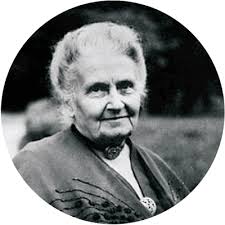“I have studied the child. I have taken what the child has given me and expressed it and that is what is called the Montessori method.” Dr Maria Montessori.
The Montessori Method is a way about thinking about who children are. It is a philosophy that respects the unique individuality of each child. Dr Montessori believed in the worthiness, value and importance of children. Her method does not compare a child to norms or standards that are measured by traditional educational systems. It is founded on the belief that children should be free to succeed and learn without restriction or criticism.
It is also an approach to education that takes to heart the needs, talents, gifts, and special individuality of each child. It is a process that helps children learn in their own way at their own pace. The main concept of Montessori is to promote the joy of learning. This joy of learning develops a well-adjusted person who has a purpose and direction in his or her life. Children, who experience the joy of learning, are happy, confident, fulfilled children. In essence, Montessori helps bring forth the gift of each child.
Another important skill it teaches is self-reliance and independence. It helps a child to become independent by teaching him or her life skills, which is called practical life. Montessori children learn to dress themselves, help cook, put their toys and clothes away and take an active part of their household, neighbourhood and school.
Montessori works in a methodical way. Each step in the process leads to the next level of learning. When a child plays, he or she is learning concepts for abstract learning. Repetition of activities is an integral part of this learning process.
For young children Montessori is a hands on approach to learning. It encourages children to develop their observation skills by doing many types of activities. These activities include use of the five senses, kinetic movement, spatial refinement, small and large motor skill coordination, and concrete knowledge that leads to later abstraction.
For a grade school child, Montessori encourages a child to proceed at his or her own pace onto abstract thinking, writing, reading, science, mathematics and most importantly, to absorb his or her culture and environment. Culture includes interaction with nature, art, music, religion, societal organizations and customs.
A Montessori teacher or instructor observes each child like a scientist, providing every child with an individual program for learning. Phoebe Child (Head of the Montessori trust in London) said “we must be prepared to wait patiently like a servant, to watch carefully like a scientist, and to understand through love and wonder like a saint.”
Most of all, Montessori wanted to help free a child’s mind to be unfettered to learn without any negative input. It is success oriented in that almost everything is self-teaching and self-correcting. The children learn by doing and by experimentation. The environment is specifically prepared for the children to allow them to interact with it freely and unfettered, everything is child sized, and safe for children to touch and use. In fact, Dr Montessori called her centre “The Children’s House”.
The main goal of Montessori is to provide a stimulating, child oriented environment that children can explore, touch, and learn without fear. An understanding parent or teacher is a large part of this child’s world. The end result is to encourage lifelong learning, the joy of learning, and happiness about one’s path and purpose in life.

